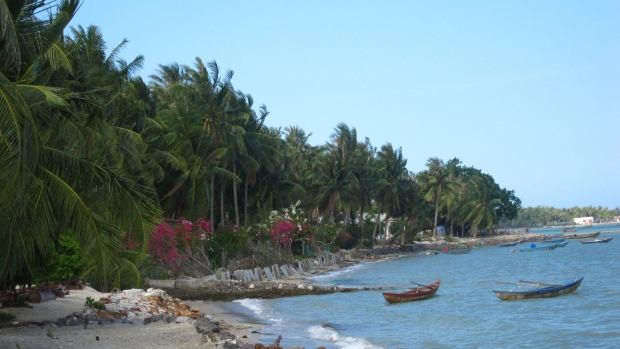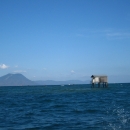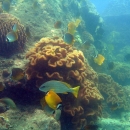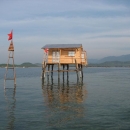Grants :: Medium Grant Facilities :: Improving the community livelihoods resilience and adaptive management of locally managed marine reserves (LMMA) of Vietnam: from local actions to national network
Improving the community livelihoods resilience and adaptive management of locally managed marine reserves (LMMA) of Vietnam: from local actions to national network

Coastline in Van Ninh District, Khanh Hoa province, Van Ninh, Khanh Hoa © MCD
Objectives
Adaptive management plan of 3 locally managed marine reserves is endorsed by the local authority and become operational with active participation and benefit of the local community through four main results including (i) capacity of LMMA managers and communities in the project sites is enhanced, (ii) Adaptive Management Plan is endorsed locally and shared with Vietnam MPA network, (iii) Resilience to CC in community livelihood is improved,and (iv) the project is managed effectively.
Background
Marine protected areas (LMMA) is known to contributing to solving part of the problem mentioned above if well and effectively managed. In 2001, the first LMMA in Vietnam was launched by Khanh Hoa provincial People’s Committee under support of DANIDA, IUCN, World Bank and former Ministry of Fisheries. In 2009, a national system of 16 LMMAs have been formally approved by Vietnam Prime Minister to be achieved by 2015.Currently six LMMA are being developed and in deferent status of governance (Nha Trang LMMA is directly managed by Khanh Hoa People’s Committee, Cu Lao Cham LMMA and Phu Quoc LMMA are directly managed by provincial Department of Agriculture and Rural Development, Con Co LMMA are directly managed by Sub-department of Capture Fisheries and Resources Protection).
Parallel with national LMMA system mentioned above, locally-managed LMMAs have been also established. Although smaller in term of area compared to national MPAs, those LMMA present habitat or species conservation value important for the local livelihoods. Initially supported by non government organization or international projects, those locally managed LMMAs was officially endorsed by government at lower level.
Practical experience of all those LMMA showed that developing LMMA adaptive management plan and mobilizing adequate financicial, political and social support to implement it remain a common challenge.
The project will be implemented in 3 locally managed Marine Protected Areas located in the Centre coast of Vietnam (here after referred as LMMA): Trao Reef LMMA, Van Hung commune, Van Ninh district, Khanh Hoa province; Nhon Hai LMMA, Nhon Hai commune, Quy Nhon city, Binh Dinh province; and Bai Huong LMMA, Tan Hiep commune, Hoi An city, Quang Nam Province.
LMMAs have scientifically valuable marine and coastal resources, especially coral reef ecosystem. According to research of Nha Trang Institute of Ocean (NIO) in 2005, Trao Reef LMMA had total about 612 species including 82 coral species and 69 fish species with 25 species of invertebrates living in the reef (NIO, 2005). NIO also recorded in 2008 that Bai Huong LMMA had over 736 species including 277 coral species and over 270 fish species living in the reef (Cu Lao Cham Management Board, 2011). Nhon Hai LMMA has not yet any research to record exactly species composition as the two other LMMAs, but observation from local showed that there are many coral reefs, fish species and especially sea turtle and breed lobsters living here.
Those LMMAs were established by different local government levels. Trao Reef LMMA and Management Board were issued by Van Ninh district People’s Committee (PC), Nhon Hai LMMA and co-management group were established by commune People Committee, Bai Huong LMMA was issued by Provincial PC and the Management board of it was issued by Tan Hiep commune people committee. Management Board members are local government officers and representatives from the communities. Those LMMAs achieved initial results such as increasing of marinelife resources, stable livelihoods of local communities, and increased local awareness on resources conservation.
However, resources in core zone (no-take zone) are facing risk of degradation caused by :
(i) Fisheries activities and limited livelihood alternatives
Main livelihoods of community in the LMMA areas are small-scale fishing and aquaculture (income from fishery occupying 80% total income of Bai Huong community and 35% of Van Hung community; 500 small fishing boats in Nhon Hai commune). Many fisheries activities affect negatively to coral reef, such as spawning net, and uncontrollably waste discharge from lobster culture in cages. Although their awareness on natural resources conservation somewhat increased through communication activities in LMMAs, some of them still over exploit or destroy coral reef. Having alternative livelihoods are significant challenges for those small scale fishers.
(ii) Climate change impact
In addition of human impact, climate change are coming to a great risk to coral reefs. According to the report of scientists (Browuyn, 2009), negative impacts of climate change has been observed in Trao Reef LMMA such as coral bleaching, storms and floods. The 11th storm in 2009 suddenly happened in the area leading to remarkable damages to community living around Trao Reef LMMA: many houses collapsed, 1000 lobster floating cages was damaged severely and about 60,000 lobsters was lost, to a cost of about 30 billion Vietnamese dong (Van Hung People’s Committee, 2009). Some local villagers became poorer and then they increased overexploitation including coral exploitation. Climate change is really an issue that managers of LMMAs need to learn how to adapt.
(iii) Weak management capacity and institutional support of LMMA Management Boards
Most of core group members of protection of LMMA are fishermen. With limited education level and without training on management skills, it’s hard for them to perform their protection task. Moreover, those LMMA management board members have not been equipped with adequate skills to develop and mobilize resources and support to implement effective management plan with sustainable financial mechanism.
Target beneficiaries
- 15 local government staffs and LMMA staffs in the project sites are able to i) mobilize the participation of their local community and support them implement sustainable livelihoods, ii) mobilize the resources and support to build and implement the LMMA adaptive management plan
- 36 local government staff understood how LMMA works and provided their support to LMMA managers and community from their capacity
-Community (poor fishermen, small scale aquaculture, women headed households): 180 people understood the relationship of coral reef ecosystems services and their livelihoods, actively participated in implement adaptive management plan; 90 households enable to manage and develop their household economy; household economy of at least 20 poor households are improved.
- 30 policy makers at national level informed about LMMAs at local level and their achievements, their issues and challenges through practices and network and provided support
Outputs
a. Capacity of local managers and communities for managing coastal resources in
the project sites is enhanced
b. Management Plans are developed, endorsed and shared with Vietnam LMMA
network
c. Resilience to Climate change in community livelihood is improved
Contributions to cross-cutting themes
Climate Change and Environmental law
Climate change and environment issue are considered as important factors effecting to project results such as communication campaigns, publications, training courses, adaptive management plan, and adaptive livelihoods development. The project can contribute to national climate change efforts through information sharing and policy advocacy. Local people involving in the above activities will understand on climate change and its impacts to coastal resources and their livelihoods. They also practice their adaptive livelihoods and management skills (reef check, management plan). 15 selected households will improve their income. 70 local government staffs and community representatives involving in reef check training will be key members in protecting coral reef and other natural resources, contributing to decrease dynamic fishing activities in their location. They themselves expand their knowledge and skills to the other community, therefore the coral reef ecosystem is protected. Those results will achieve resilience to climate change.
Poverty
Poor fishermen are directly exploit fisheries resources, even coral reef in LMMA areas, causing a high pressure for natural resources. In addition, they are limited livelihood access. Therefore, development of livelihood recommendations will involve their participation and propose adaptive livelihood recommendations. Moreover, benefits of the poor are concerned in the LMMA management plans.
Gender equality
Women play a critical role in both coastal development economies and in efforts to conserve coastal resources but often face significant challenges to contribute to effective management. Traditionally, women in the project sites often just work as housewives. They have very limited role in livelihood development of their family. They also rarely involve in training courses, social network, local meetings, etc. so they have limited access to knowledge and skills on household economy, livelihoods, resources protection, climate change, etc. MCD believes that including women in coastal management and livelihood development will not only benefit marine conservation, but also develop the communities’ capacities, to enable effective and sustainable management of their local coastal resource and increasing their adaptive capacity in the context of climate change impacts.
The project will be mainstreaming gender and development approach in the coastal resources management and climate change adaptation. Most of LMMA Management Board members are men, but the project will involve women participate in all project activities, such as in all meetings, training courses and promotion, development and implementation of LMMA management plan. In addition, women, especially single mothers will involve in livelihood activities: training course on household economy and priority in selected list of funded households. Among 15 selected households, there are at least 4 single mothers households.
Project Facts
Country
Location
(i) Trao Reef LMMA, Van Hung commune, Van Ninh district, Khanh Hoa province, (ii) Nhon Hai LMMA, Nhon Hai commune, Quy Nhon city, Binh Dinh province, (iii) Bai Huong LMMA, Cu Lao Cham islands, Hoi An city, Quang Nam province
Topic
- Knowledge for Management
- Civil Society Engagement
- Coastal Governance
- Financing Coastal Conservation
- Community Resilence
- Gender equality
- Marine Protected Areas
- Capacity Building
- Knowledge management and communications
Duration
1st Apr 2013 to 31st Mar 2015
MFF Grant Amount
USD58,236
Implementing Partner
Ms. Vu Thi Thao (Coastal Resources Management Officer cum Climate Change Focal Point Officer)
Centre for Marinelife Conservation and Community Development (MCD)
Head Office
Suite 3104, Level 31, Building 34T
Hoang Dao Thuy Street, Cau Giay District, Hanoi, Vietnam
Mobile: 0166 417 5689
Phone : +84 4. 2221 2923, ext 125
Fax : +84 4 2221 2924
Email: vtthao@mcdvietnam.org
Web: www.mcdvietnam.org
Facebook: www.facebook.com/mcdvietnam.org


